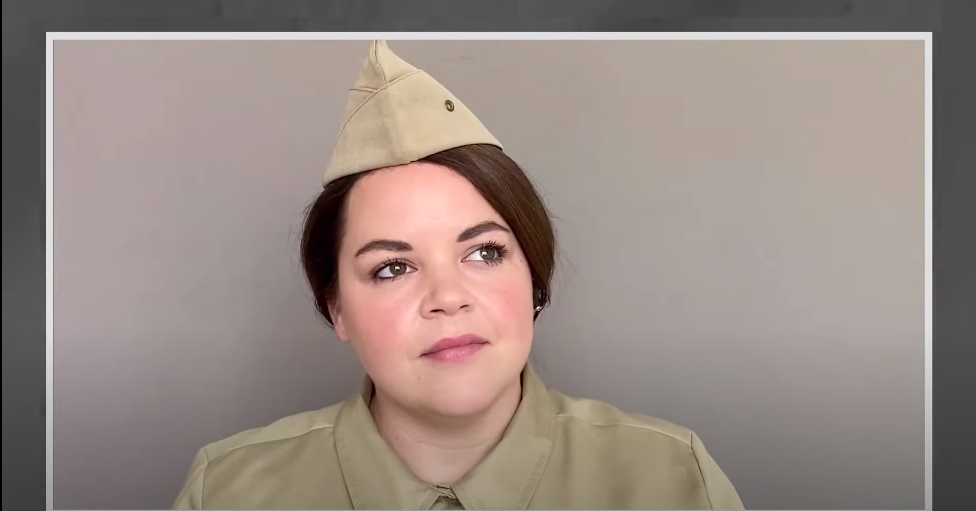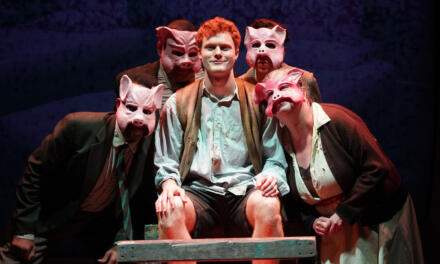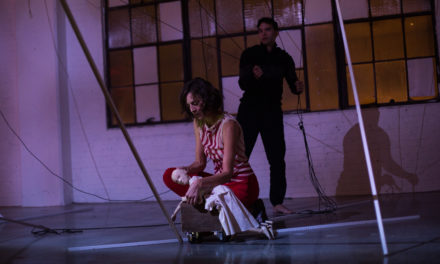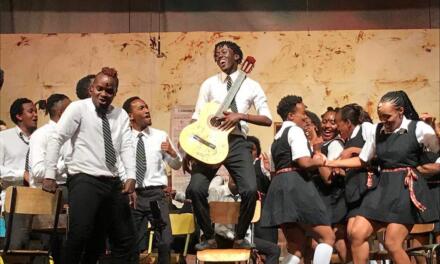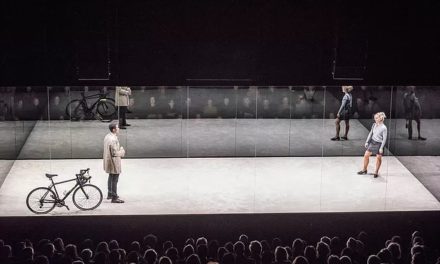On the last Monday in August, just as the summer temperatures were starting to cool a bit, Rattlestick Playwrights Theater presented a benefit concert of SOLDIERGIRLS, a new musical comedy based on real love letters written by two women in the Women’s Army Corps during World War II. The benefit raised money for SPART*A (Service Members, Partners, Allies for Respect and Tolerance for All).
The two-person show was created by Em Weinstein (they/them) book and lyrics, and Emily Johnson-Erday (she/her) music. The show was created over the last year and originally workshopped with New York Theatre Workshop and Rattlestick Playwrights Theater with a commission from En Garde Arts.
The evening after the benefit, which showcased excerpts of the show interlaced with background from Weinstein, Johnson-Erday, and other members of the creative team, Weinstein shared thoughts on the show and the experience of creating a world from nothing.
CC: Maybe we could start with a little bit about your background?
EW: I grew up in New York and LA and a little bit actually in rural Oregon where my Dad has always lived. My Mom is an experimental theater artist and a writer and a playwright, so I grew up doing theater from the time I was little. I went to Smith College, and then I directed professionally after college, and then I did a fellowship with the Drama League, Shakespeare & Company and I went to the [Yale] School of Drama for my MFA and graduated last year. I can tell you a little bit of background about the show if that’s helpful?
CC: Yes, perfect segue – that was going to be my next question.
EW: About a year-and-a-half ago, Anne Hamburger who runs the company called En Garde Arts came to me with an article that she had read called The Lesbian Menace. It was out of this book called Becoming G.I. Jane which is about the Women’s Army Corps in World War II and the founding of a section of the American military for women in the early 40s. It was this really interesting article basically about how the Army ignored that lesbians existed, and then sort of freaked out and tried to hide the fact that they existed once that they discovered the fact that there were gay women enlisting in the Army.
She [asked me] do you think you can make a play out of this? I was honestly not sure, and then ended up doing a workshop for five days with the New York Theatre Workshop at Adelphi University on Long Island where I got to bring in two actors and a Dramaturg. We ended up over those five days kind of hashing out a whole bunch of stuff and figuring out that it was going to be this two-person musical.
My Dramaturg, Rebecca Adelsheim, did all this research and found all of these amazing letters which the show is based on. For the past year or so, I’ve been developing the show and brought on this really wonderful composer [Johnson-Erday] to work with. This presentation we did last night was the culmination of this fellowship that I’ve been doing for Rattlestick and a showcase of where we’re at right now.
CC: How did it go last night?
EW: It went really well. It was a real joy to put it together. It’s a two-person show but for this benefit, I wanted to enlist a whole bunch of different actors, so we ended up having about 12 performers who were doing voice. It ended up being a really fun event, and we ended up raising money for the benefit of this organization that I wanted to support. I just opened up [the YouTube link] and we’ve had a thousand views! Which is crazy because the theater we [originally] were going to do it in was under a hundred seats, so it’s sort of one silver lining to this [COVID-19] craziness.
CC: What are you hoping the audience takes away from the performance?
EW: I think there’s a couple of things. One, I’m passionate about queer history and placing queer history in the larger American narrative that we think we know, but that have always excluded queer people. I hope that the audience comes away with a little bit more knowledge of that history. The show is funny and silly and sweet and sort of sexy, silly and I want the audience to have a good time. Even though I think the work is darker, I want it to inspire joy and to be a lot of fun, as well as informative, and hopefully kind of inspiring. I got some nice notes from young, queer artists about how the representation of queer people mattered. There are so few queer female musicals. There’s a lot on Broadway that centers around gay men but there’s so little that centers around trans people or binary people or gay women. There’s Fun Home and there are some shows from the 90s and the 80s, but it’s like very, very, very, very, slim volume.
I was eager to add to that and that’s why it was so cool to have some amazing Broadway performers and out-queer – not everyone was out-queer in the show – but a lot of the performers in the show are out-queer actors who have been on Broadway or have been on television. It meant a lot to them to be a part of this because they rarely get to play those characters and that was what I wanted the audience to take away from the performance too.
CC: What’s your experience of the fellowship with Rattlestick been like?
EW: It’s been so nice! I think that Rattlestick is just such an amazing theater and actually my first experience of Rattlestick was when I was really, really little. My Mom, who is a playwright, had one of her plays done there in the 90s and I actually remember being a little kid visiting Rattlestick.
This fellowship is given to one of the three directors who graduate Yale every year, and when I got the fellowship I was just so excited because it sort of felt like a homecoming. This whole year has been special like that – it’s just such an incredible institution that with a tiny budget and a tiny staff really, really supports artists, so it’s been wonderful.
CC: A lot of your previous work has included Shakespeare’s works – how does Shakespeare influence your work? How do Shakespearean plays or language influence your work?
EW: Shakespeare is one of my first loves…when I lose direction with what kind of artist I want to be, I look at his work for many reasons. One, he writes incredible characters regardless of their identity. Some of his female characters are brilliant. I think he writes queer characters, even though that’s not the language he had, but he writes characters with ambiguous genders and ambiguous sexualities. I think that I didn’t necessarily know it as a kid, but there was something about how Shakespeare saw gender and how Shakespeare saw sexuality and identity that just resonated with me when I was a kid. I was like, I don’t understand who I am in this world, but I understand girls dressing up as boys, and I understand girls falling in love with boys dressed up as girls who are dressed up as boys. It made sense to me in a way that almost nothing else did when I was little, and so I just try and work on Shakespeare when I can because it just completely connects me to why I want to be an artist.
I think it’s important for us as artists to connect to why we’re doing what we’re doing, and if you can have just one favorite movie or one favorite playwright or favorite song – it helps you so much.
CC: Speaking of favorites, do you have a favorite?
EW: Shakespeare is always my favorite.
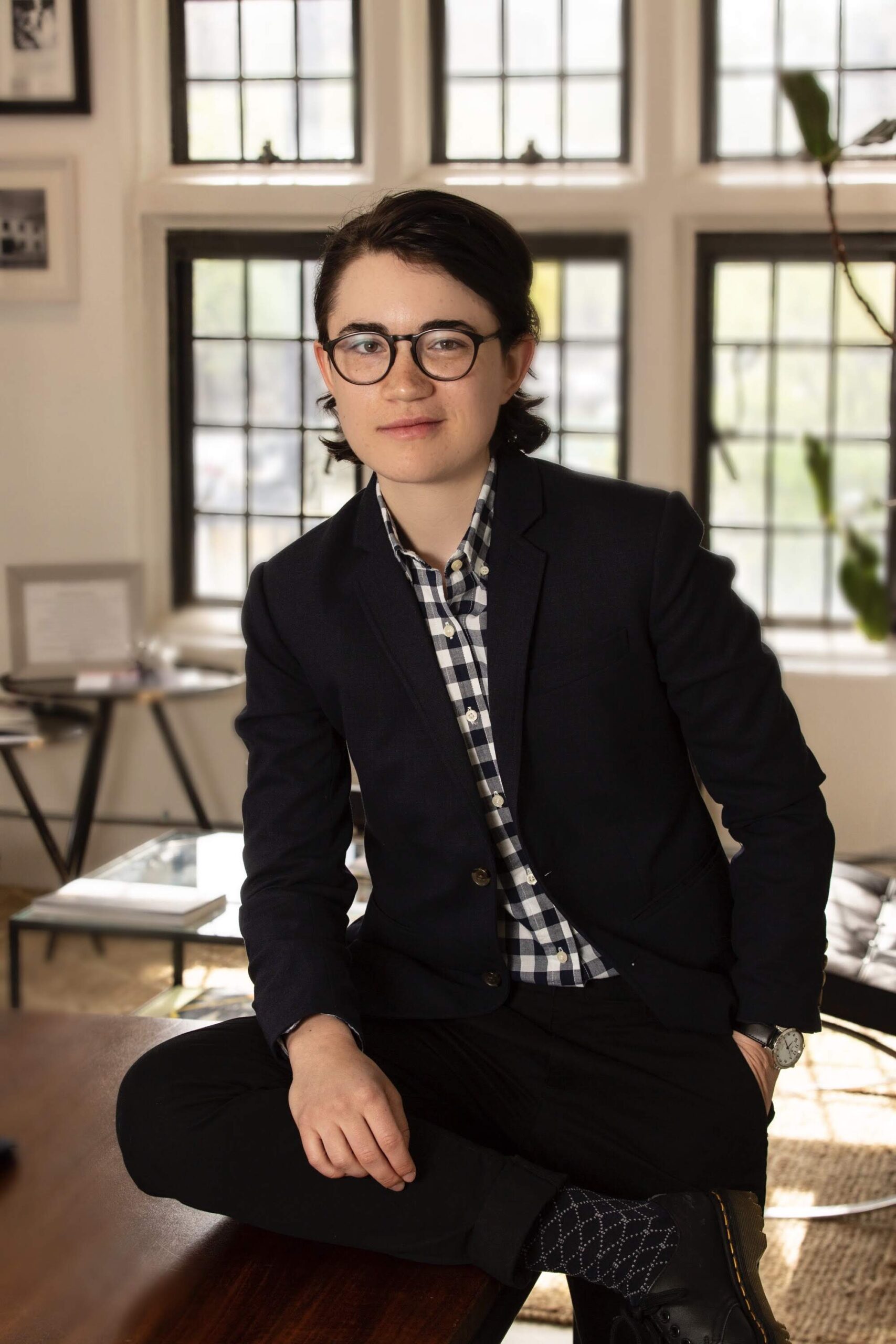
Em Weinstein. Photo by T. Charles Erickson.
CC: Yes but which one?
EW: Oh – favorite play! My favorite has always been As You Like It, weirdly, ever since, I saw it at the Globe and was completely obsessed with it. I have to say Hamlet because it’s so incredible, but I have to say that As You Like It has always been one of my favorites because it combines his philosophical work with his comedies with weird musings on environmentalism. It’s just sort of a mess, and I love everything about it. It was my thesis in grad school, but it’s still probably my favorite. It’s really hard to pick.
CC: In general, your writing process – it sounds like it was different for SOLDIERGIRLS, but how do you normally approach writing?
EW: It feels like a new process every time – I’m sort of a baby writer when it comes to writing. I have worked mostly as a Director, but every project is sort of different. Writing is sort of the hardest thing in the world and the most fun thing in the world at the same time.
Usually, I like to start with research or a world that I want the thing to take place in. For theater, I like to give myself constraints. So for this, the constraint was that I wanted to write this for two people, partially because I love 2-person plays. There aren’t enough of them, and also, they’re so much more producible, and it’s amazing to watch two people pull something off, so I gave myself that challenge. It sort of opened up the door for me in terms of what the piece was going to be like stylistically – I wanted it to be a bunch of different genres and I wanted it to be ironic and funny and also heartfelt at the same time. That was all sort of outside-in thinking about this piece which isn’t always how it is, but helped me get into it. The more I worked on it, the more I have fallen in love with the characters and their story, but it frankly came about by thinking about the structure itself, and what I wanted to play to feel like and how I wanted it to be formed versus what it was actually going to be – form then content rather than the other way around.
I think everyone is different and people might argue that you cannot separate form, and content but I at least spent a lot of time thinking that way and then this play came out of that. But I don’t know – maybe in a year, I might say, “I don’t why I said that.” There’s something that feels really mysterious about it.
CC: Why do you like to give yourself constraints?
EW: I think theater – you need constraints in theater because you’re building a world out of nothing. Whereas – I do a lot of film and TV, with that you’re often building out of the real world at least out of the constraints of reality because you show – unless you’re an experimental filmmaker – you’re mostly going to make something realistic because film is a very literal medium.
Whereas theater, the world could be literally anything. You could be in a Robert Wilson world where the entire stage is white and everyone walks – really this is a joke – but everyone walks really slowly and has bald caps on and their faces painted white and they’re chanting in a monotone. That is a world of theater that is 100% relevant. For me, having grown up in an experimental theater world, if I don’t understand what the rules of the world are, I can’t start to create in it. I never assume in theater that the rules of the world are the rules of reality outside of the stage. I’m not really interested in putting naturalism on stage. If I’m going to make something that’s realistic or naturalistic or not heightened in any way, then, I would usually rather do that as a movie.
I always want to create something that’s new, that’s theatrical, that’s going to take place in front of a live audience, and so, I have to build that world. For me, I like to figure it out at least a little bit before I start writing so I can understand what the constraints are of the world. In this show, for example, there are only two people, so you know, you can’t have a scene with three people, that’s just one of the rules of this world. It’s also a world in which there’s a lot of love and humor and lightness as well as them talking about dark, horrible things like being broken up with, and being kicked out the military for being gay. But for the most part, the rules of this world are that it favors the light.
For more information about SOLDIERGIRLS, visit www.soldiergirls.org or watch a recent piece about SOLDIERGIRLS by PBS here https://www.pbs.org/video/soldiergirls-0lbekw/.
This post was written by the author in their personal capacity.The opinions expressed in this article are the author’s own and do not reflect the view of The Theatre Times, their staff or collaborators.
This post was written by Clare Cioffero.
The views expressed here belong to the author and do not necessarily reflect our views and opinions.

